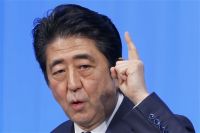Japan's new security law takes effect in major defense policy shift

Prime Minister Shinzo Abe AP Photo
TOKYO —
Japan’s new security laws took effect Tuesday, enabling its troops to fight overseas for the first time since World War II in a landmark defense policy shift in a country with a war-renouncing Constitution.
The reform enacted by the government of Prime Minister Shinzo Abe is partly a response to the changing security environment Japan faces, such as China’s military assertiveness and North Korea’s nuclear and missile threats. But it remains controversial among the public who fear the laws could erode Japan’s postwar pacifism.
The laws largely expand the role of the Self-Defense Forces overseas. The most notable change is that Japan is now allowed, in a limited manner, to exercise the right to collective self-defense—or coming to the aid of the United States and other friendly nations under armed attack even if Japan itself is not attacked.
Previous governments maintained the view that Japan has that right under international law, but cannot exercise it due to Article 9 of the Constitution that bans the use of force to settle international disputes.
Citing changes in the security environment, Abe’s Cabinet decided in July 2014 to reinterpret the Constitution and laid out three conditions to allow the exercise of the right: if a friendly nation is under attack which results in a threat to Japan’s survival; if there are no other appropriate means to repel the attack; and if the use of force is limited to the minimum extent necessary.
Japan and the United States “can now help each other during emergency situations,” Abe told a Diet committee Tuesday, adding, “The bond of the alliance has been strengthened” by the laws.
But the move aroused strong opposition among a significant portion of the public, including youths generally thought to have been politically apathetic, after constitutional scholars invited by both the ruling and opposition parties to testify before a Diet commission called the changes unconstitutional.
Critics have also been concerned about how the government will judge what constitutes a threat to Japan’s survival. During Diet deliberations last year, Abe only cited a few examples of the possible exercise of collective self-defense, such as minesweeping missions in the Strait of Hormuz or protecting U.S. ships transporting Japanese citizens being evacuated from the Korean Peninsula in a crisis.
The laws have been under fire from opposition parties, and their constitutionality is almost certain to become a main issue in the House of Councillors election this summer.
“I have thought through what the necessary self-defense measures are to fulfill the government’s responsibility to protect the lives of Japanese people,” Abe told a parliamentary committee Monday, underscoring that the laws will help strengthen Japan’s alliance with the United States and boost deterrence.
But the head of the main opposition Democratic Party, which was formed Sunday through the merger of two parties, said the laws should be scrapped.
“Prime Minister Abe changed the interpretation of the Constitution by force,” Katsuya Okada said during a street speech Monday. “Is it OK to change the Constitution’s pacifism so easily?” he asked.
China and other Asian neighbors which suffered under Japan’s wartime brutality urged the Japanese government to act with discretion.
A Kyodo News poll conducted Saturday and Sunday found 49.9 percent of respondents are not in favor of the laws, while 39.0 percent view them in a positive light.
The new laws enacted by the Diet last September also expand logistical support for U.S. and other foreign troops.
The SDF is also allowed greater scope to use arms while participating in U.N. peacekeeping operations, and to rescue either peacekeepers from other countries or U.N. staff under attack in areas other than those in which the SDF troops are deployed.
The government plans not to assign new missions to the SDF anytime soon, sources close to the matter have said, so as not to exacerbate public concerns ahead of the upper house election.
The public has remained divided over the issue.
A Kyodo poll last June showed that 56.7 percent of respondents said they view the security bills as unconstitutional.
However, a poll last month showed 47.0 percent were against scrapping the security laws, compared with 38.1 percent who said they should be scrapped.
© KYODO
© 2016 GPlusMedia Co., Ltd.